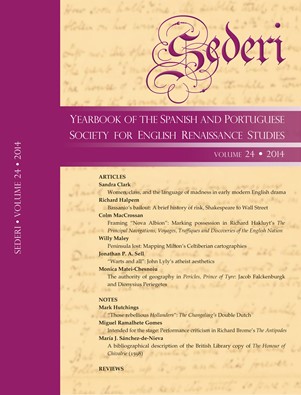The authority of geography in Pericles, Prince of Tyre: Jacob Falckenburgk and Dionysius Periegetes
Palabras clave:
Shakespeare, romances, geography, Latin, Falckenburgk, Periegetes, Renaissance dramaResumen
Taking into account the complex authorship of Pericles, Prince of Tyre, this paper surveys the intertextual influence of the Latin verse narrative of the Apollonius saga by Jacob Falckenburgk (London, 1578) and Thomas Twayne’s translation of Orbis terrae descriptio (The Surveye of the world) by Dionysius Periegetes (London, 1572) on the erratic geography of Pericles. Drawing on the Pericles/Apollonius tales (the play and its Latin verse and English prose intertexts), as well as the ancient geographic narrative describing the Eastern Mediterranean spaces of the settings, the play decentres the authority of ancient geography maintained via the well-travelled Apollonius tale or through the weight of classical texts. Pericles destabilizes the authority of both classical language and geography through a process of defamiliarization of and distancing from the legitimization of ancient texts and geographic tradition. Through the suggestion of alterity during the dramatic interaction, the play incorporates the recognition of difference and the support of tolerance within early modern transnational communities.
Descargas
Descargas
Publicado
Número
Sección
Licencia
The copyright holder of the published contributions is SEDERI.The hardcopy and an open-access version of the journal will be published simultaneously. The issues will be available online in the SEDERI website (http://www.sederi.org/yearbook/) and other repositories that have signed an agreement with SEDERI.
The authors who publish with this journal agree to the following terms:
a) SEDERI retains copyright of the essay.
b) If the author wishes to republish or rewrite the essay for another journal, or include the essay published in SEDERI in their personal repositories, or in any other way, they should contact the editors to obtain permission to do so. This will entail citing SEDERI as the original source and sending the editors a copy of the new version, or the link to the website, in case of online publishing.
The author(s) hereby warrant(s) that:
a) The essay submitted for publication is an original creation and does not infringe any copyright or property right of another journal, author or publisher.
b) The essay submitted for publication has not been previously published, whole or in part, and is not being considered for publication elsewhere.
c) Written permission has been obtained for any material from other sources included in the essay submitted for publication.




